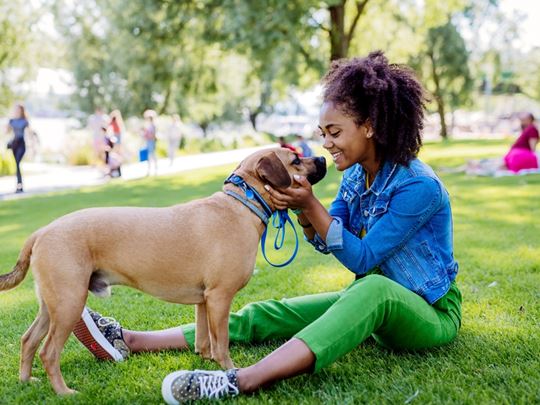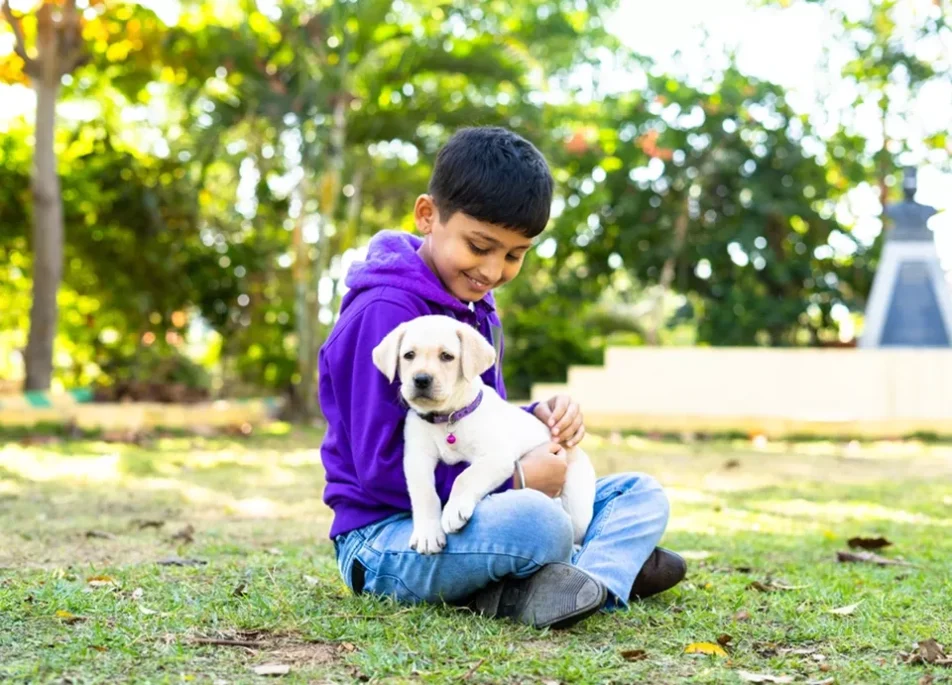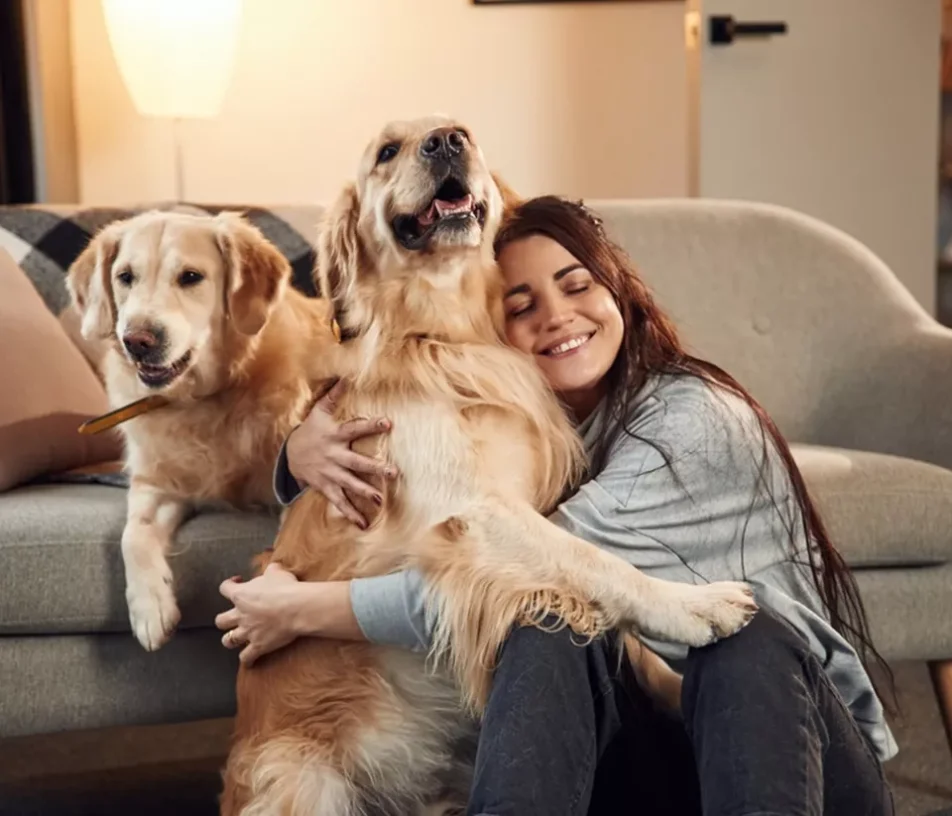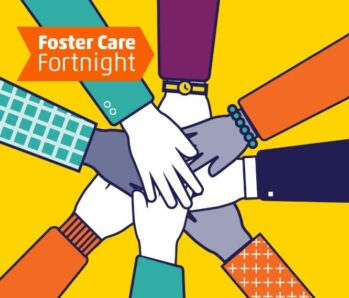Whether you already have a dog or are thinking about making a dog a part of your family, the benefits of having a dog with children may surprise you!
Not only is there nothing like the warm welcome of a dog excited to see you after a long day. But those expressive eyes and wagging tails can change your outlook on life.

6 Benefits of Having a Dog with Children
Dogs Can Teach Children about Responsibility
Dogs can teach children about taking care of others and having responsibility. For younger children, this could mean helping care for your dog by filling up their food and water bowls, and for older children, they could assist in bathing and walking the dog. You could also include your child in dog training, getting them involved in teaching your dog to play fetch or how to sit.
Dogs Can Help Children Make Friends
Dogs can help children to practice making friends and use social skills, such as speaking, empathy and understanding nonverbal communication. They can do this by practising talking to other children with their dog, learning to understand their dog’s needs through nonverbal cues and empathising with their wants and needs. Additionally, dogs are good conversation starters. Other children may also have pets they can’t wait to talk about!
Dog and Child Friendships can Encourage Inclusivity
Children can form profound friendships with dogs. Dog and human relationships are remarkable because they rely solely on empathy, nonverbal communication and mutual respect. We can speak to dogs; they can’t respond with words, but we still understand them. Learning to understand others in this way promotes inclusion and diversity of friendships. Children can harness these skills and bond with those who speak another language or can’t communicate verbally for whatever reason.
Dogs may be the ideal pet for Neurodivergent and Disabled Children
Neurodivergent and disabled children can benefit from dogs in the same way as neurotypical and non-disabled children; however, there are some additional benefits and charities that have been created specifically for this purpose:
- The Autism Dogs Charity trains dogs for therapy to help neurodivergent children with autism. Trained dogs can stop autistic children from inflicting harm on themselves and calm them down during a meltdown.
- Dog A.I.D help train dogs to assist disabled adults and children with day-to-day tasks, such as using light switches and closing doors.
- Guide Dogs make life easier for those who are blind or partially sighted, being the child’s eyes when crossing the road or finding specific items.
- Hearing Dogs for Deaf People are trained to assist adults and children who are deaf or hard of hearing, alerting their owners of sounds like the doorbell or alarm clock.
Dogs Can Have a Positive Impact on Mental Health
At FCA, we believe in taking a therapeutic approach to foster parenting. Children in care often have trauma from abuse and neglect. Their mental health and well-being are crucial aspects of the therapeutic approach, helping children develop healthy ways to overcome trauma.
Here are a few ways dogs can positively impact your foster child’s mental wellbeing:
- Spending time with a dog can reduce stress hormones and increase oxytocin levels, positively impacting mental health.
- Companionship with a dog can reduce feelings of loneliness.
- The responsibility of a dog can give your children a purpose and sense of achievement, boosting self-esteem.
- Dogs will encourage your children to get fresh air and exercise; both are crucial for good mental health.
- Dogs can be a comfort through loss, helping children work through their grief.
Banned Breeds
The Dangerous Dog Act 1991 lists the following dogs as banned breeds:
- Pit Bull Terrier
- Pit Bull Terrier Types – Irish Staffordshire Bull Terrier, Irish Blue or Red Nose and American Staffordshire Terrier
- Japanese Tosa
- Dogo Argentino
- Fila Brasileiro
American Bully XL are banned in England and Wales and will be in Scotland from 31st July 2024.
Our priority is the welfare and safety of the children in your care. For this reason, if you have a dog listed as a banned breed or acquire one whilst already fostering, you must relinquish them to continue fostering.
What is included in the Pet Assessment?
The pet assessment will include questions related to your pet and their upkeep:
- What types of pets live in your home? Do you have any livestock?
- Description of your pet – How did you acquire them? What is their typical behaviour and personality like? What is their history?
- Living arrangements – What areas can they access in the home, and are any parts of the home restricted? What are the feeding arrangements?
- Health and Hygiene – Are they registered with a vet? Do they receive regular vaccinations and parasite treatments? Where do your pets go to the toilet? If you imported your pet from overseas, you must show evidence of a pet passport.
- Have you had any investigations or convictions under the Dangerous Dogs Act (1991) or the Animal Welfare Act (2006)?
Additional questions for owners of Dogs:
- Is your dog a banned breed?
- Has your dog ever shown signs of aggression?
- Is your dog a breed to be cautious of? – Dobermann, Neapolitan Mastiff, German Shepherd, Rottweiler and Japanese Akita.
You will then need to enter the full details of your dog, including their name, breed, routine, training and any contact your dog has had with children. Following this, you will fill out a dog safety checklist with details about behaviour, such as biting, snarling, aggression and their response to crying babies. If you use your home for breeding, grooming or running kennels, you’ll reflect on how this could impact your foster child.
Sometimes, the answers to these questions lead to a specialist behavioural dog assessment to fully clarify if your dog will be safe around children. Your supervising social worker will also include their observations of your pet when they have visited your home, such as behaviours, hygiene and safety.
We know most pet owners are responsible, but for FCA, foster children and young people’s safety and welfare are our primary concern; this is why we require so much detail.
If you have any questions about the pet assessment, contact us or speak to your supervising social worker.
Important things to remember if you decide to get a dog with children
- Dogs are a commitment and require daily walks, mental stimulation, training, grooming and trips to the vet. If you don’t want this additional responsibility, a dog may not be the right pet for you and your family. Cats require commitment but are more independent than dogs; they could be a good alternative.
- Never leave a dog alone with a child. Your dog may be friendly and loving towards your child; however, they are animals and can act unexpectedly. It is best not to risk your child’s safety by leaving them alone with a dog.
- Take time to consider the breed of dog that would be best for your family. Golden retrievers and Labradors, for example, are well-known for having gentle temperaments, lots of energy, and love a good cuddle.
- Dogs are an additional expense; they need food, toys, regular parasite treatments, vet visits and possibly the occasional kennel boarding. Depending on the breed and history of the dog, you may also need to pay for expert training.
Tips for introducing a dog to a foster child or young person:
- Talk to your foster child about introducing a dog into your home, allowing them to express their feelings about the prospect.
- If you visit or are collecting your dog, let your foster child go along so they are part of the process.
- Introduce the dog and your foster child in a calm and quiet environment, and make sure you supervise their interactions.
- Don’t force interactions, and make sure the dog doesn’t feel trapped by discouraging hugging and leaving the dog space to move away if they are unhappy.
- Your foster child could offer the dog a treat or a toy to play with to help them bond.
- Help your foster child understand that they must leave the dog alone when the dog is eating or sleeping.
The Dog’s Trust offers a free virtual course called ‘Living Happily Together’. The course teaches you how to read your dog’s body language, gain practical advice about child safety and unsafe behaviour with dogs and consider a routine that helps the dog integrate into the family.
If you are fostering or contemplating fostering and have any questions or concerns about having pets with children, please get in touch or talk to your supervising social worker.






